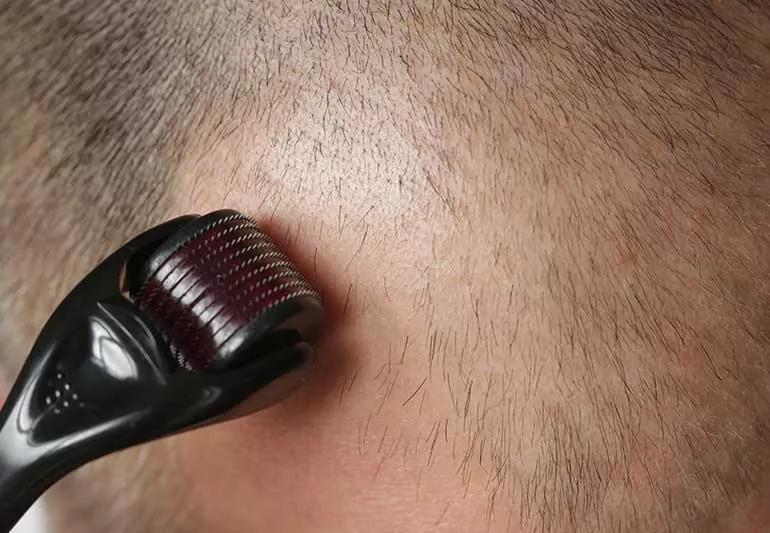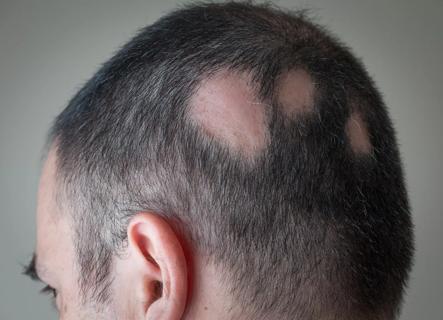Microneedling can help regrow hair, but only for certain types of hair loss

Microneedling is an effective way to reduce the appearance of scars, dark spots and wrinkles on your skin. It’s a minimally invasive treatment that triggers a wound-healing response that can help your skin look younger.
Advertisement
Cleveland Clinic is a non-profit academic medical center. Advertising on our site helps support our mission. We do not endorse non-Cleveland Clinic products or services. Policy
Some evidence suggests microneedling, also called dermarolling, can also stimulate hair growth. Could it be a solution for thinning hair? Dermatology resident Taylor Bullock, MD, explains what you should know before trying this treatment.
Microneedling works by jump-starting your skin’s natural healing process. Your dermatologist rolls a device with thin needles over your skin, creating tiny micro-injuries. Your skin responds by sending more blood flow to the area and rebuilding its collagen to heal the wounds.
This wound-healing response also happens on your scalp, which can help regrow hair in some cases. “The needles we use in a dermatologist’s office are long enough to affect the hair follicle, where your hair starts to grow,” explains Dr. Bullock. “The extra blood flow, collagen and wound-healing process can help your follicles produce thicker hair.”
Microneedling can also help topical medications like minoxidil (Rogaine®) penetrate your scalp, which could boost their effects. “Minoxidil increases blood flow to your scalp, prompting hair to grow in thicker,” says Dr. Bullock. “Using microneedling in combination with minoxidil is more effective than either treatment alone. The needles help open the skin barrier and deliver the medication at a deeper level.”
Advertisement
But Dr. Bullock cautions that microneedling isn’t a magic bullet for all hair thinning. “Microneedling only helps with certain types of hair loss,” he notes. “If you have hair loss due to an iron deficiency, for example, you should focus your efforts on iron supplementation and finding the root cause of your deficiency.”
So, what kinds of hair loss can microneedling treat? Studies have shown that microneedling can treat androgenetic alopecia (male and female pattern baldness) and some cases of alopecia areata. “Your dermatologist may run tests to find out what type of hair loss you have,” says Dr. Bullock. “Then, you can discuss what’s causing your hair loss and how to effectively treat it.”
So, before you spend time and money on microneedling (or any other hair loss treatment), see a licensed dermatologist first. They can give you a correct diagnosis and recommend options that work for your specific needs.
Platelet-rich plasma (PRP) therapy has gotten a lot of press as a hair loss remedy. A healthcare provider injects platelets from your own blood under your skin to prompt it to produce more collagen. And in some cases, providers use it topically with microneedling for extra hair-thickening power.
“PRP therapy can help regrow hair, when used on top of standard treatments for diagnosed hair disorders,” says Dr. Bullock. “But like microneedling, there is only research evidence supporting the use of PRP therapy for treating androgenetic alopecia and alopecia areata.”
If you’re dealing with hair thinning, it’s tempting to pick up an at-home microneedling device so you can get immediate results. But store-bought devices don’t compare to a professional microneedling treatment.
“The at-home microneedling devices are very different from the devices we use in a dermatologist’s office,” warns Dr. Bullock. “In the office, we use longer needles that have a more powerful effect. The needles you get in an at-home device are often less than one-tenth the length of what we use.”
You can purchase a dermaroller from a reputable company, but don’t expect the same results as professional microneedling. “At-home devices might help medications penetrate better,” says Dr. Bullock. “But home dermarollers aren’t going to trigger the collagen and wound-healing response you get from a dermatologist’s treatment.”
There’s a reason why at-home devices use much shorter needles. Using a dermatologist-grade device at home isn’t safe.
Advertisement
“Using a medical-grade dermaroller at home would be very painful,” warns Dr. Bullock. “You also could permanently damage your skin or get an infection. Only a licensed and appropriately trained provider should use these devices.”
When a dermatologist performs microneedling in the office, they apply a numbing medication first. They also sterilize the equipment and take steps to prevent infection. “We have training in how to safely use these powerful devices,” states Dr. Bullock. “If you want to do microneedling at home, stick to the devices meant for at-home use. And don’t overuse them — more isn’t necessarily better. You need to give your skin time to heal between treatments.”
“Hair loss is complex,” Dr. Bullock says. “Your treatment will only work if it’s addressing the root cause. That’s why your first step should be getting a medical diagnosis.”
There’s hope if you’re dealing with thinning locks. “You don’t have to accept hair thinning as a part of life,” he reassures. “Many treatments are available, and research continues to find new hair loss treatments. It’s exciting to see patients experience a confidence boost when we help them regrow their hair.”
Advertisement
Learn more about our editorial process.
Advertisement

Take steps to reduce stress by practicing meditation, finding time to relax and maintaining a healthy lifestyle

You may see pitting, brittleness or ridges in your fingernails and toenails

Your immune system may attack hair follicles anywhere on your body

It’s normal to lose around 50 to 150 strands per day to routine hair shedding

Studies are mixed, but frequently wearing very tight, warm hats could stress your follicles and lead to hair loss

Things like stress, heated styling and other health conditions may cause you to lose more hair than normal

Creatine does cause some side effects, but hair loss probably isn’t one of them

A gentle hair care routine, stress reduction and sun protection can help reduce flares and maintain your locks

The tropical fruit is a good source of antioxidants and vitamin C

Most people fall asleep within 10 to 20 minutes, but if your experience is different, adjusting your sleep schedule may help

Exploring your hidden side can lead to better understanding of what makes you tick